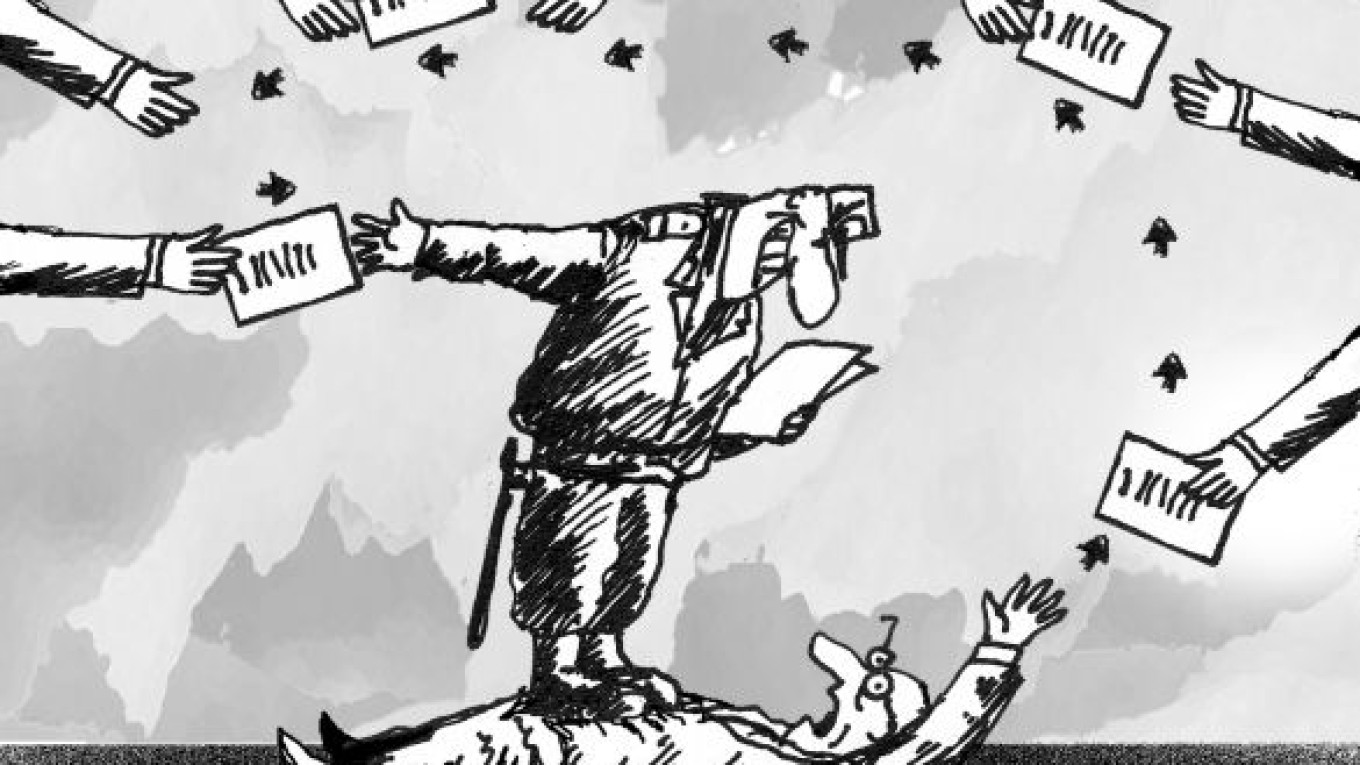After lawyer Sergei Magnitsky died in a pretrial detention cell in a Moscow prison on Nov. 16, State Duma deputies and President Dmitry Medvedev started using the word “humanization” a lot. This word needs to be applied to the country’s corrupt and criminal law enforcement agencies. Magnitsky was denied medical care after he reportedly refused to give false testimony against Hermitage Capital head William Browder on trumped-up tax evasion charges and refused to withdraw his allegations that Interior Ministry officials stole $230 million in state funds.
The Magnitsky case received worldwide attention, but there are thousands of other businesspeople who are held in Russian pretrial detention centers on false charges. This is a common method that corrupt law enforcement officials use to extort bribes and seize businesses.
On Dec. 29, Medvedev signed a law to help reduce these abuses. Among other things, the law bans pretrial jailing of suspects in first-
offense tax cases. This is a good start, but much more has to be done to solve the deeper problem of jailing innocent people.
Russia has no mechanisms to protect individuals who are imprisoned on false charges. When victims file complaints, they are often punished by a corrupt system in which law enforcement officials protect one another at every level. The complaints get bounced around in a bureaucratic runaround, going from one prosecutor and investigator to another. The process ultimately ends with a pro forma letter assuring the detainees that all actions taken against them were in accordance with the law.
If this is the way that complaints are handled, then even the president has no chance of organizing an independent review of corruption cases in which he has taken such a strong interest in his battle against bureaucrats who “nightmarize” business.
It is clear why Medvedev has focused so much attention on this problem. By counting the number of people convicted for economic crimes in relation to the level of corruption in law enforcement agencies, it is easy to see that there is an inordinate number of innocent people who are sitting in Russian prisons. And the amounts of money extorted by corrupt law enforcement officials and investigators is growing daily, in some cases reaching as high as $15 million. Businesspeople are often forced to pay bribes to law enforcement officials as the only way to avoid having a false criminal case brought against them.
At a meeting with Prosecutor General Yury Chaika on the professional holiday honoring the employees of prosecutors’ offices, Medvedev reminded Chaika of the law that he signed limiting the use of arrests against criminals in tax-
evasion cases. It is notable that the president used that word “criminals,” which I doubt was a slip of the tongue. Until guilt has been proven in a court of law, nobody has the right to refer to that person as a criminal. What happened to Russia’s adherence to the principal of presumption of innocence? In Russia, when a person is arrested, it is often assumed that he is guilty. This mentality has to change if Russia wants to modernize or “humanize” its judicial system. Law enforcement officials and society as whole need to adhere to the principle of “innocent until proven guilty.” Once this is accomplished, the road will be paved for further “humanization” of the judicial system, such as reducing prison terms for those convicted of economic crimes and protecting the rights of prisoners and detainees.
It is a shame that Medvedev and the Duma are not doing more to solve the deeper problem of extortion and raiding by law enforcement officials. The most we can expect from these so-called reforms is that businesspeople held in jail on false charges might have their sentences reduced. To be sure, this is badly needed since the sentences that they receive on white-collar charges often exceed the sentences that cold-blooded murderers receive. But perhaps Medvedev and Russia’s lawmakers should aim a little higher and take measures so that these innocent people don’t end up in jail in the first place.
Yana Yakovleva, financial director of a Moscow-based chemical company, spent seven months in a pretrial detention center on charges of selling chemicals without a license, which were later dropped. She founded Business Solidarity, a nongovernmental organization that lobbies for legal changes and defends businesspeople against extortion, raiding and false criminal charges initiated by government officials.
A Message from The Moscow Times:
Dear readers,
We are facing unprecedented challenges. Russia's Prosecutor General's Office has designated The Moscow Times as an "undesirable" organization, criminalizing our work and putting our staff at risk of prosecution. This follows our earlier unjust labeling as a "foreign agent."
These actions are direct attempts to silence independent journalism in Russia. The authorities claim our work "discredits the decisions of the Russian leadership." We see things differently: we strive to provide accurate, unbiased reporting on Russia.
We, the journalists of The Moscow Times, refuse to be silenced. But to continue our work, we need your help.
Your support, no matter how small, makes a world of difference. If you can, please support us monthly starting from just $2. It's quick to set up, and every contribution makes a significant impact.
By supporting The Moscow Times, you're defending open, independent journalism in the face of repression. Thank you for standing with us.
Remind me later.


